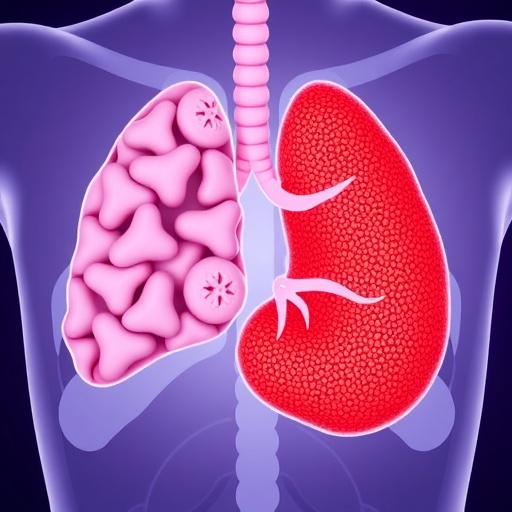In a groundbreaking multicentric study conducted across two leading cancer centers in India, researchers have unveiled critical insights into the safety and efficacy of the immunotherapeutic regimen combining atezolizumab and bevacizumab for patients battling unresectable hepatocellular carcinoma (HCC). This study emerges at a pivotal moment when therapeutic options for advanced liver cancer remain limited, especially in real-world populations that often diverge from controlled clinical trial cohorts.
Hepatocellular carcinoma, the most common primary liver malignancy, poses a significant global health challenge as the sixth most incident cancer and the third leading cause of cancer-related mortality worldwide. Despite advances in locoregional therapies and systemic treatments, a substantial subset of HCC patients progresses to unresectable disease, underscoring the urgent need for effective systemic options. Immunotherapy has recently reshaped the oncological landscape in this setting, with atezolizumab—a monoclonal antibody targeting PD-L1—combined with bevacizumab, an anti-VEGF monoclonal antibody, becoming the first-line standard of care after the IMbrave150 trial demonstrated improved overall and progression-free survival.
The Indian study, retrospectively analyzing data from 104 patients treated from September 2020 to May 2024, offers the first comprehensive evaluation of this combination therapy within the Indian demographic and healthcare context. With a median patient age of 67 years, the cohort presents a realistic portrait of advanced HCC patients encountered in routine practice, including a wide spectrum of liver function statuses classified by the Child-Pugh scoring system.
.adsslot_HGg9VopXkB{width:728px !important;height:90px !important;}
@media(max-width:1199px){ .adsslot_HGg9VopXkB{width:468px !important;height:60px !important;}
}
@media(max-width:767px){ .adsslot_HGg9VopXkB{width:320px !important;height:50px !important;}
}
ADVERTISEMENT
Notably, the majority of patients (74%) had compensated cirrhosis (Child-Pugh A), but a significant proportion presented with more advanced hepatic insufficiency—18% were Child-Pugh B and 3% Child-Pugh C—highlighting a key divergence from the stringent inclusion criteria of the IMbrave150 trial that primarily enrolled Child-Pugh A patients. This heterogeneity underscores the complexity of translating clinical trial findings into real-world settings, where comorbidities and liver dysfunction often complicate therapeutic administration and outcomes.
Administered intravenously every three weeks as per the IMbrave150 protocol, atezolizumab dosing was standardized at 1200 mg, while bevacizumab was dosed at 15 mg/kg. The retrospective design leveraged detailed records capturing demographics, treatment-related adverse events, and radiological responses, facilitating a nuanced assessment of safety and efficacy.
The study’s findings reveal a median overall survival (OS) of 14.8 months (95% confidence interval [CI]: 6.8–22.9) with a corresponding median progression-free survival (PFS) of 6.2 months (95% CI: 2.5–9.9). These figures, while slightly lower than the landmark IMbrave150 trial outcomes, remain clinically significant, especially given the inclusion of patients with more advanced liver dysfunction. The reduced survival metrics likely reflect the broader eligibility criteria employed in routine clinical practice and the consequent increased frailty of the patient cohort.
Safety analyses demonstrated that the combination therapy maintains an acceptable toxicity profile in this real-world population. Adverse events were manageable, enabling continuation of treatment in most cases, though the study does not specify detailed rates of individual toxicities. These safety data bolster the argument for broader application of atezolizumab-bevacizumab in unresectable HCC beyond the strictly regulated confines of randomized trials.
This study also sheds light on potential challenges faced by clinicians treating HCC in India, including the prevalence of advanced cirrhosis at diagnosis and resource constraints impacting continuous monitoring and management of treatment-emergent effects. The authors underscore the need for individualized risk-benefit analyses to optimize outcomes in patients who may traditionally be deemed ineligible for immunotherapy.
The broader implications of this study resonate with the global oncology community’s ongoing efforts to refine patient selection for immunotherapy regimens. Incorporating patients with varying degrees of liver dysfunction may help delineate subgroups that derive the most benefit from atezolizumab-bevacizumab, while also identifying those at greater risk of adverse outcomes. Such stratification is vital for tailoring therapies in real-world settings that often differ markedly from trial populations.
Moreover, the multicentric nature of the study enhances the generalizability of its findings, reflecting diverse clinical practices and patient characteristics across healthcare facilities. This diversity is crucial in ensuring that immunotherapy strategies are both effective and feasible on a population scale, encompassing geographic, genetic, and socioeconomic variations.
While retrospective in nature, this research lays essential groundwork for future prospective studies that could integrate biomarkers of response, refine dosing strategies, and explore combination regimens that may further improve outcomes. The emerging data on atezolizumab-bevacizumab in diverse populations reinforce the transformative potential of immune checkpoint inhibitors enhanced by anti-angiogenic therapy in HCC.
As immunotherapy continues to evolve rapidly, integrating findings from varying populations and clinical contexts will be indispensable. The study’s results advocate for continued vigilance in managing toxicities and caution in extending treatment to patients with advanced cirrhosis, while also encouraging broadening access to these potentially life-prolonging therapies.
This multicentric Indian experience enriches the global understanding of immunotherapy application in HCC, providing a valuable reference point for oncologists grappling with the complexities of treating diverse and challenging patient populations in routine practice.
Through ongoing research and collaboration, the oncology community edges closer to achieving more personalized, effective, and accessible care for patients with hepatocellular carcinoma worldwide, illuminating a path forward against this formidable disease.
Subject of Research: Safety and efficacy of atezolizumab and bevacizumab combination therapy in patients with unresectable hepatocellular carcinoma.
Article Title: Safety and efficacy of atezolizumab/bevacizumab in unresectable hepatocellular carcinoma—a multicentric study.
Article References:
Babu, M., Komaranchath, A.S., Valsan, A. et al. Safety and efficacy of atezolizumab/bevacizumab in unresectable hepatocellular carcinoma—a multicentric study. BMC Cancer 25, 1026 (2025). https://doi.org/10.1186/s12885-025-14400-9
Image Credits: Scienmag.com
DOI: https://doi.org/10.1186/s12885-025-14400-9
Tags: advanced liver cancer therapiesatezolizumab and bevacizumab combination therapycancer treatment in Indiahepatocellular carcinoma treatmentimmunotherapy for liver cancermulticentric study on HCCpatient outcomes in liver cancerPD-L1 and VEGF targeting drugsreal-world data in oncologysafety and efficacy of cancer drugssystemic therapy for hepatocellular carcinomaunresectable liver cancer options





